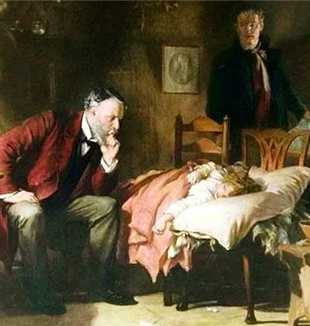
The Audacity of Hope
“The Audacity of Hope” was a discussion on hope and the patient-provider relationship in the journey of cancer patients...Last month Crossroads Houston hosted the first event of its eighth season at the University of St. Thomas. “The Audacity of Hope” was a discussion on hope and the patient-provider relationship in the journey of cancer patients. “In front of sickness and death”, the invitation proposed, “both patient and caregiver are confronted with fundamental questions: What is the meaning of this illness? Why is there pain and death? Is there a role for hope now?”
The event was born from a striking friendship with Fr. Tullio, Chaplain at the National Cancer Institute in Milan, who is conducting research on the role of hope in cancer patients at the Methodist Research Institute in Houston. After encountering Fr. Tullio, one could not but be struck by his humanity, his understanding of the essential needs of the hearts of those facing a life changing diagnosis, which are the same needs of each one’s hearts. To enter the dialogue with Fr. Tullio, we invited Cristiano Ferrario, a medical oncologist in Montreal with an exceptional experience of relationship with cancer patients, as he described on his article published on Traces (December 2015). Moved by the exceptional awareness of these two speakers, friends at Crossroads Houston were ready to verify whether reality is positive, even in the most challenging circumstances.
Over 100 people attended the event, including health practitioners, university students, professionals, families, and other members of the Houston community. Some people traveled for more than two hours from other Texas cities including Brenham and Austin. The audience also included an increasing number of friends among the faculty and leadership of St. Thomas University who have fully embraced Crossroads’ proposal to look with openness, curiosity and critical judgement at every aspect of reality.
Fr. Tullio described his journey from a parish priest in Milan to a chaplain in one of the major cancer institutes in Italy. Seeking to start a dialogue with physicians and to help them in accompanying their patients, he realized that a change in method was needed. “To enter in real and authentic dialogue with physicians, I could not merely use ecclesial words, I needed to speak their language”. He began a research project using the scientific method to quantify the unquantifiable in order to comprehend the meaning of hope for cancer patients. “Hope is neither optimism nor illusion, especially for Christians”, he said. Fr. Tullio was not surprised when results from his research demonstrated that hope is a crucial factor in the journey of cancer patients. However, his carefully conducted research had more to reveal about the origin of hope. His findings show that hope arises when a cancer patient is accompanied, supported, cared for, not as a medical puzzle, but as a whole person.
How can one look at someone as a whole person, accompanying them in a journey filled with so much uncertainty? “This cannot be a result of a strategy”, Cristiano said, “but of an encounter”. “The first thing that a patient asks of their provider is to be looked at, to be available for an encounter in that relationship”. Cristiano described his experience accompanying cancer patients whose urge for meaning could not be silenced, even after hearing news of a successful treatment. “It is always a surprise for me when I let the other enter my horizon. I often experience that their questions become my questions”. He also spoke about a relationship with Carla, his late patient and friend who, through her extraordinary journey, became a “witness of freedom as the ultimate defeat of cancer”. Cristiano’s remarks were followed by a video featuring an interview with Sofie, a young Canadian patient, whose trajectory facing a cancer diagnosis was changed by her relationship with him. “The fact that he was there”, she said, “assuring me he would be there every step of the way, made the whole difference for me”. Sofie’s experience shed a clear light on Fr. Tullio’s research findings: hope is indeed generated through a relationship with another. Sofie’s contribution also helped us understand Fr. Giussani’s words quoted by Cristiano: “hope is certainty for the future, based on a present reality, based on a Presence.”
After the event, speakers were surrounded by members of the audience who were awestruck by the newness of that dialogue. “The things I heard here tonight will be with me for life,” said the director of Ethics in a large hospice care service in Austin, Texas. One nursing student, said “I can easily see how this topic is relevant to my field, but I also see how it is relevant in all aspects of my life. I too, need to be accompanied in my journey through life”. A few days later, a physics professor at a local university wrote to us: “It is very refreshing, motivating, encouraging to see the intent that Crossroads has to tackle serious issues in a thoughtful and hopeful way. On that Monday, the subject was serious disease, end of life, death. You would think that nothing positive could be said about this. Yet, instead, we were exposed to professionals who work with this on a daily basis, who still have hope and want their patients discover that this is a possibility in their lives, whether or not, in the end, they are "cured" or "saved" by the medical effort. Where else can we get to see something like this?”
The video of this event is available at crossroadsculturalcenter.org.